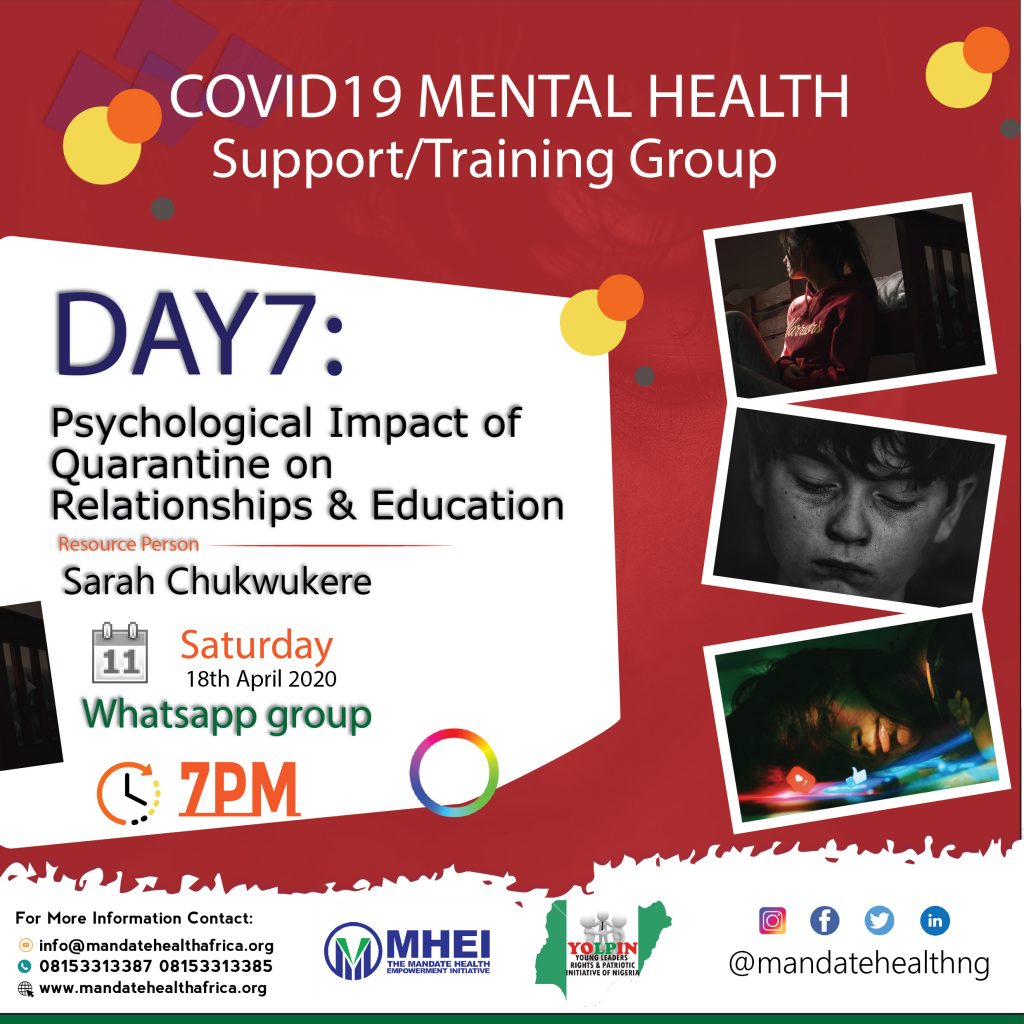Lesson 3: Psychological Impact of Quarantine on Relationships, Education; The lecture applies to relationships.
(Mrs Sarah Chukukere)
All types of relationships including
- Romantic
- Friendship
- Family
- Etc
In the era of the Covid-19 virus, stringent methods like quarantine and social distancing will make us redefine and recalibrate our relationships. Mandatory quarantine which is being used across the globe to control the spread of the virus has the potential of putting immense stress on relationships as people end up being stuck in together in a sometimes-uncomfortable situation with no options.
In this context, I am not just talking about romantic relationships, but relationships that involve a shared living situation which includes but is not limited to;
- Married/unmarried couples living with or without children &/or siblings.
- Friends or roommates living together.
- Grown kids living with/or taking care of their aged parents
This new living situation may be why there has also been increased reports of domestic violence around the world. One report from the UK says that there has been a 30% increase in reports on domestic violence. Though we were built to be social and live with each other, we were not programmed to be next to each other every waking moment of the day. Consequently, there are several psychological effects that quarantine could have on an individual.
In fact after this pandemic is over people will need a lot of counselling for
- post-traumatic stress symptoms
- confusion
- anger
- avoidance behavior
So, what are the things that could put stress on relationships?
- longer quarantine duration
- Financial loss or no finance
- Loss of jobs
- infection fears
- frustration
- boredom
- inadequate supplies
- inadequate information
- and stigma.
To mention a few
- If there are children in a house,
- more things will be broken,
- they may start misbehaving for attention
- One person may get tired of doing all the house work and lash out
STRATEGIES FOR COPING
Maintaining a good healthy relationship during this period will take a lot of willpower, patience & positivity. However, here are some not-so-obvious tips for coping.
The Rule of 4: For every 1 bad trait, think of 4 good ones: We all have bad traits we may/or may not know about, however the quarantine may become a magnifying glass on these traits. During this time, it is advised not to dwell on the bad traits, instead think about 4 other good traits the person has. Doing this as a regular mental exercise could help you maintain a good relationship.
Nostalgia: Think about the good times and spend a few minutes every day reminiscing about precious moments. Remind yourself of memorable events in the past or why you fell in love or have a deep bond. This can help you see how far you have come and, help you look forward towards a brighter future.
Pinch of salt: Instead of striving for a better partner by commenting on every single thing or mistakes , concentrate on avoiding or overlooking elementary mistakes or “take it with a pinch of salt” as they say. Know that you are also far from perfect and probably make your own mistakes too.
Fight to control your own negative reactions, this period is a great time for emotional learning to increase our emotional intelligence. Negative reactions to situations on make them worse. If the affront is one you can’t endure, then say something, but do it calmly without retaliating, because the negativity effect can quickly turn a small disagreement into a raging battle.
Take some time out to play couples games. Most couples don’t realize how much they don’t know about each other rather, they usually assume certain things. For example, a couples Q&A session could reveal that a boyfriend actually does not prefer to sleep on the left side of the bed, but does so to make it easier for his girlfriend to sleep next to the window because she gets really hot at night.
Here is a fun game I like to give couples I counsel to play.
- What’s your partner’s least favorite body part?
- When your partner was a child, what did they want to be when they grew up?
- Name a country your partner would love to visit.
- Did your partner have a nickname as a child? What was it? Bonus point: Did they like the nickname? Why?
- Which of your partner’s aunts or uncles are they closest to? [Skip if not applicable]
- What disappointment or rejection from your partner’s past still stings?
- Which of your partner’s achievements are they most proud of?
- What is your partner’s least favorite housework task?
- Name two of your partner’s grandparents. Bonus point: Can you name all their grandparents?
- Outside of their career, what’s something your partner considers themselves naturally talented at?
- What is your partner’s favorite smell?
- What is your partner’s favorite flavor of ice cream?
- What is a personality trait your partner dislikes about themselves, and that they share with a parent?
- Of all the ways there are to die, which does your partner fear the most?
- What type of music does your partner secretly like? What’s a musical taste they have that most people wouldn’t know they enjoy?
- What does your partner typically look forward to most about the weekend?
- Who is someone your partner considers to be a mentor, or who has been a strong positive influence on their professional development?
- How did your partner spend their summers as a child?
- What is your partner’s favorite and least favorite aspects of their work?
- Does your partner consider themselves more like their mother or their father in terms of personality? In what way?
- What purchase is your partner currently considering?
- What’s on their wish list?





